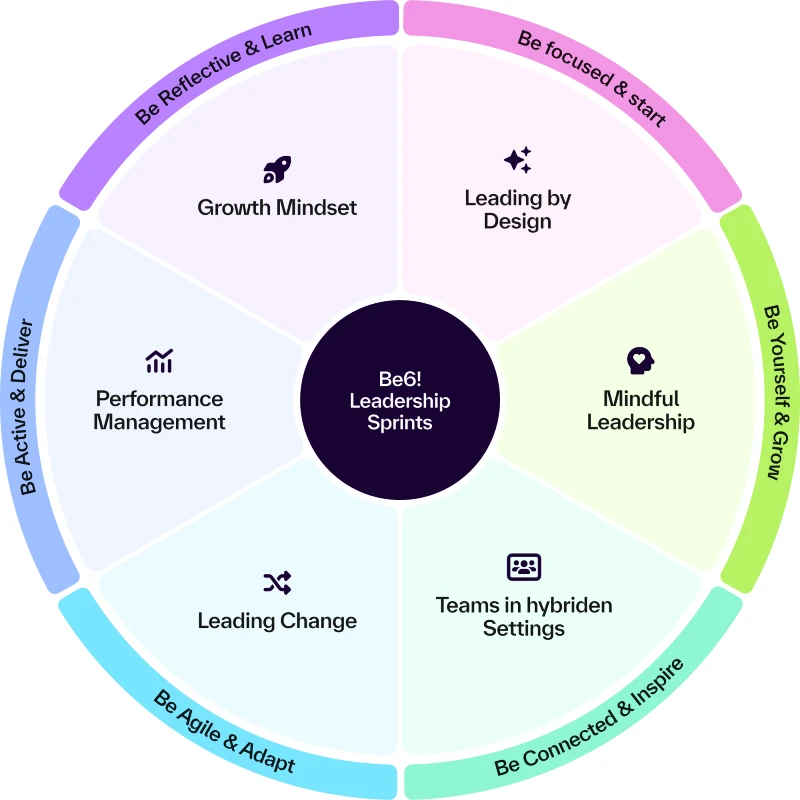"I quit!" - two words, big impact. According to a survey conducted by XING and Appinio in 2023, 43% quit due to dissatisfaction with their manager(source).
But what if you reverse this trend?
Good-humored employees, full of energy and ideas. Talented people who are eager to work in your company instead of looking for the next exit. Sounds utopian? Perhaps. But this is exactly where management development comes into play.
Nowadays, more employees than ever are looking for meaning, appreciation and development opportunities in their jobs. A strong leadership culture can make all the difference in this environment. But how do you develop managers who not only delegate tasks but also inspire people?
In this article, we take a look behind the scenes of modern leadership development. How companies are transforming their managers into mentors who not only achieve goals but also unleash potential.
Core elements of leadership development
73% of managers are not able to lead safely through crises(source). This indicates how important leadership development should continue to be in personnel development. It includes all targeted measures and instruments for the further development of managers. It is not only about promoting current managers, but also about preparing promising junior staff for future management roles.
At its core, management development therefore aims to improve the skills, knowledge and abilities that managers need to successfully perform their role. This includes both professional and interpersonal aspects and is geared towards the company's overarching objectives. Managers should therefore be able to inspire teams, think strategically and manage change successfully. The development focuses on the following triad:
Leading Yourself (self-leadership)
The ability to lead oneself is the starting point for every successful manager. In order to lead a team successfully, managers should first know their own strengths and weaknesses and continuously work on themselves. Self-reflection plays a crucial role in this.
In the BANI world (acronym for brittle, anxious, non-linear and imcomprehensible), resilience is also a key factor in the development of a company. resilience is also essential. Managers develop strategies to remain capable of acting even in times of crisis. Another important aspect here is the growth mindset - the conviction that skills can be continuously improved through commitment and learning. Managers with a growth mindset see challenges as opportunities for further development, not as threats. This not only promotes personal development, but also establishes a culture of continuous learning within the company.
Leading Others (employee management)
Above all, effective team leadership means inspiring and empowering others. Creating psychological safety is central to this. Managers should learn to create an environment in which employees feel confident to contribute ideas and take risks. An understanding of team dynamics also enables managers to make the best possible use of their team members' strengths. Today, managers also need to master agile methods in order to be able to react flexibly to new challenges.
Leading Business (corporate management)
In the area of corporate management, strategic thinking and action are crucial for the long-term success of a company. Managers should be prepared to successfully accompany change processes. The ability to develop and communicate an inspiring vision is a core characteristic of successful leadership.
Methods and instruments of management development
The development of managers requires a multifaceted approach. Modern leadership development relies on a mixture of proven techniques and innovative approaches to meet the complex requirements.
Coaching and mentoring play a central role in leadership development. In coaching, such as the Executive Coaching program offered by Haufe Akademie , managers work with professional coaches to address specific challenges and expand their leadership skills. Mentoring programs, on the other hand, bring experienced managers together with young talent to share knowledge and experience. Both approaches offer personalized support and promote self-reflection.
Experience-based learning is becoming increasingly important. Action learning projects enable managers to solve real business problems and develop their skills in the process. Simulations and role-plays provide safe environments to try out new leadership techniques and receive feedback. These practical experiences are particularly valuable as they are directly transferable to everyday working life.
Using short, entertaining learning units in everyday working life. Our attention span is getting shorter and shorter. This has been shown by an international research team. Micro- and nano-learning formats are therefore ideal: they enable continuous learning and rapid adaptation to new challenges.
The leadership library for agile learning design
500+ learning nuggets for leadership development in a variety of formats for different levels of experience and learning preferences.
Using new technologies to make learning more varied. Companies are already using virtual and augmented reality. This allows them to simulate situations and create an immersive learning experience. AI can also provide important impetus in management development, e.g. as a sparring partner or when creating a learning plan.
Networking events offer opportunities to exchange ideas and make valuable contacts. This allows managers to learn from the experiences of others.
Maximum effect, minimum time
Leadership Sprints
Develop leadership skills in a compact and practical way - with minimum time expenditure and maximum impact. The leadership sprints fit flexibly into any management routine and strengthen both the skillset and mindset for modern leadership. Whether individually or in full - discover the new way of leadership development!
Leadership Sprints
The process of leadership development: 7 steps to success
Successful management development requires a structured and systematic approach that is geared towards the individual needs of managers and the strategic goals of the company. The process consists of several interlinked steps:
1. analysis and assessment
The first step is a thorough analysis of managers' current skills and development needs. Tools such as competence profiles or assessment centers help to identify strengths and weaknesses. This forms the basis for creating customized development plans.
2. development planning
A development plan defines clear objectives, prioritizes the skills to be developed and specifies which methods and tools are to be used. The planning should be flexible enough to be able to react to changes in the company environment.
3. selection of methods
Choosing the right methods is crucial. Depending on the objective, coaching, mentoring, seminars, workshops, e-learning or experience-based learning can be used. A combination of different approaches often makes sense in order to cover different learning needs.
4. resources and costs
Effective leadership development requires investment in time, money and personnel. Companies must ensure that sufficient resources are available to implement the planned measures.
5. qualification and promotion
In this phase, the planned measures are implemented. Managers take part in training sessions, work with coaches or mentors and implement what they have learned in their day-to-day work. Practical transfer is particularly relevant here. What has been learned must be applied so that it can be consolidated. Regular exchanges with mentors and other managers help to recognize progress and make adjustments.
6. review and evaluation
In addition to regular reviews during the process, the overall process should also be evaluated at the end of the plan. Have the set goals been achieved? What positive changes are visible? What could be improved? These findings are incorporated into future programs and ensure continuous optimization.
7. commitment and sustainability
The final step aims to anchor the skills developed in the long term. Regular refresher or follow-up training ensures that what has been learned is not lost. At the same time, this helps to retain talent in the company and motivate them in the long term.
A structured process ensures that managers continue to develop. This not only strengthens their personal skills, but also enables companies to successfully overcome challenges. Would you like to establish leadership development in your company? Redesign leadership with an individual leadership development program.
The role of HR in leadership development
Human Resources (HR) plays a critical role in leadership development programs and is instrumental in aligning leadership development with business objectives.
One of HR's main tasks is to design and coordinate the Development Programs. HR works closely with managers and specialist departments to identify specific needs. personnel developers act as facilitators and consultant by supporting managers in implementing what they have learned in their day-to-day work.
HR is also responsible for the evaluation and continuous improvement of the programs.
Challenges and tips
| The challenge | Solution approach |
| Measuring the return on learning (ROL) | Implementation of clear KPIs and advanced analytics tools. Use of LMS or LXP for an overview of participation and success rates. |
| Advancing technology | Integration of tech learning |
| Cross-generational leadership | Implementation of collaborative projects |
| Continuous learning | Use of microlearning and adaptive learning |
| Practical development | Focus on direct application in everyday working life. |
| Relevance of soft skills | Targeted programs to promote empathy and adaptability. |
This table illustrates how modern management development can respond to current challenges. Particularly noteworthy is the focus on continuous learning and the development of soft skills, which are becoming increasingly important.
The future of leadership development
Management development is increasingly becoming an indispensable component of successful corporate strategies.
The training of new managers goes far beyond traditional training: modern approaches rely on technology, personalization and continuous learning to prepare managers for the challenges of tomorrow. The focus is on holistic development that promotes soft skills such as emotional intelligence and adaptability in addition to technical skills. Companies that invest in strategically aligned, future-oriented management development not only create competent leaders, but also secure their competitiveness.
Scalable management development: flexible and efficient
The Leadership Kit of the Haufe Akademie supports companies in making their leadership development scalable, digital, and cost-effective. With ready-made learning modules, you can design your learning efficiently and resource-efficiently, allowing you to respond agilely to new needs.
✔ Digital & ready-to-use learning nuggets for maximum flexibility
✔ Scalable business solutions of any size
✔ Time- and cost-efficient training for managers
Learn more about the Leadership Kit
Ultimately, effective leadership development is an ongoing process that must be deeply rooted in the corporate culture.





